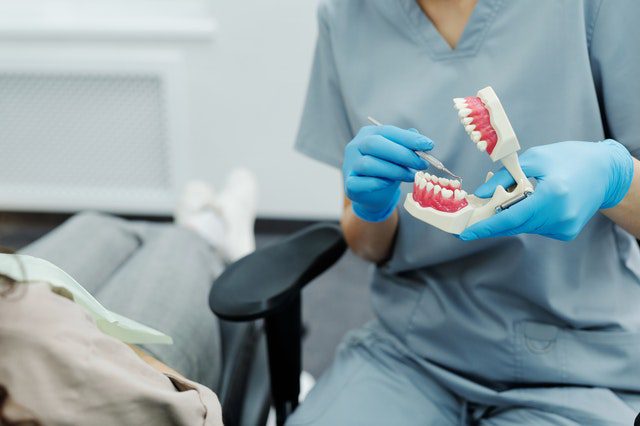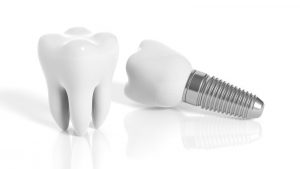It’s hard to objectively answer which way of replacing lost teeth is “best,” because everyone’s mouth is different. We can discuss what’s ideal in cases of lost teeth, but a patient’s needs, health or dental coverage means each case can be different. There are four main methods for replacing teeth: dentures, bridges, implant bridges, and dental implants. Each have their own pros and cons, with the big factors being extent of restoration, cosmetic improvement, invasiveness/health requirements, and cost.
Dentures
When they first came on the oral-surgery scene, dentures were a total bummer. Everyone’s seen those old TV shows where Grandma’s teeth fall into her wine glass. Remember Mrs. Doubtfire? Poorly-fitting dentures were just the norm. Thankfully, dentures haven’t been left in the dust as dental technology has advanced, so they’re no longer a nightmare. For some people, this option for tooth replacement is the only option, which isn’t ideal, but at least it’s affordable!
Pros
- No surgical procedures
- Can replace entire rows of teeth, creating a consistent appearance
- Easy Maintenance
- Even people with extremely poor jaw health can get dentures
Cons
- You have to deal with using temporary dentures while a mold of your mouth is being made
- As your jaw changes, dentures won’t fit right and will need replaced
- Might limit ability to taste if they also cover your palate
- Removable dentures might move around or make clacking noises
There are two options for dentures: fixed and removable. Fixed dentures require enough jaw health for four anchor dental implants to hold the dentures in place. Usually referred to as the all-on-four, fixed dentures do have a bit more health requirements than removable ones, but as the jaw changes and the dentures stop fitting, fixed dentures won’t move or make that weird clacking sound when you talk or chew.
Dental Bridges
Bridges are another affordable way to restore a smile by replacing lost teeth. Dental bridges have a leg up on dentures in terms of functioning like normal teeth. In a traditional bridge, a crown on either side of the bridge support it. In a cantilever bridge, one crown supports the entire bridge. Depending on where the missing teeth are and how many, your oral surgeon will determine which is best for restoring the look and function of your bite.
Pros
- No surgical procedure required
- More stable than dentures since they’re anchored to teeth and not gums
- More affordable than dental implants
- More likely to be covered under dental insurance than implants
Cons
- Healthy teeth must be altered to fit the anchor crown(s)
- Need to be replaced often (5-10 years, depending on the age of the patient)
- Dental bridges don’t stop the jaw from deteriorating where the missing teeth are
- Can cause more damage and decay to the teeth around it
There’s one more type of non-surgical dental bridge, called the Maryland Bridge, where the bridge is held in place by metal that’s adhered to the back of the teeth. The cool thing about this type of dental bridge is that the dentist or oral surgeon installing the bridge doesn’t have to alter healthy teeth to secure it, but these types of bridges can also damage the anchor teeth and the surrounding teeth, and the metal isn’t nearly as resilient as your jaw and natural teeth.
Dental Implant Bridges
This type of bridge is a step up from non-invasive bridges in terms of holistic and restorative tooth replacement. These are typically used in cases where the patient has several missing teeth in a row and either doesn’t have the jaw health to do a dental implant to replace each missing tooth, or getting each tooth replaced with a single dental implant is cost-prohibitive.
Pros
- No alterations to health teeth required
- The implant anchors on either end of the bridge preserve bone loss in the jaw
- Look and function more naturally than traditional dental bridge types
- More affordable/less invasive than replacing each tooth with a single dental implant
Cons
- 3 stages of treatment that may take up to 6 months or more
- Patient may need dental bone grafting prior to implant surgery
- Less likely to be covered by dental insurance
- Don’t last as long as implants because the jaw will still deteriorate where the middle missing teeth between the implants are.
Implant-supported bridges are a great way to replace a series of missing teeth in a way that looks and functions naturally without requiring such extensive dental implant surgery to replace each missing tooth independently. Admittedly, patients must have decent jaw health, so they’re not a possible solution for everyone, but they’re a solid option for many patients with several teeth in a row missing.
Dental Implants
True dental implants are far and away the most holistic and functionally-restorative option for tooth replacement, and they also look the most natural of all the options. Unsurprisingly, those factors make them the most expensive option as well. While we would love to give every patient who needs mouth reconstruction dental implants, it isn’t always possible.
Pros
- Preserves the health of your jawbone by replacing the function of the tooth roots
- Longest-lasting tooth replacement option (10-20+ years, depending on the patient)
- Completely natural look and function
- Dental implants are most cost-effective over the long term
Cons
- A single dental implant can cost upwards of $800, depending on the oral surgery practice
- Patients may need dental bone grafting before implant surgery
- From start to finish, can take upwards of 6 months for proper osseointegration
- Jaw bone has to be in good condition
Some oral surgeons offer affordable dental implant surgery by working with insurance companies and only charging for the amount of anesthesia used, instead of the industry-standard charge. This can greatly reduce the up-front cost of the dental implants, which, besides jaw health, is the most common reason people choose other tooth replacement options. The best oral and maxillofacial surgeons will also offer same-day dental implants for patients with sufficient jaw health.
Which Tooth Replacement Option is Best for You?
So, as we’ve discussed, each method of replacing missing teeth that have been lost or extracted due to decay or injury has different advantages and disadvantages. In theory, there really aren’t any cons to dental implants, because they replace the cosmetic and biological function of a lost tooth. But in reality, dental implants are just not the right answer for everyone who needs tooth replacement, especially in cases of full mouth reconstructions due to facial trauma or disease.
Ask your local oral surgeon for an exam and a consultation on which option might be right for you so you can get back the confidence and health that comes with a complete smile.










